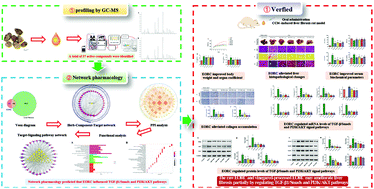Essential oil from the raw and vinegar-processed Rhizoma Curcumae ameliorate CCl4-induced liver fibrosis: integrating network pharmacology and molecular mechanism evaluation†
Abstract
Liver fibrosis, caused by multiple chronic liver injuries, is a known contributor to cirrhosis and even liver cancer. As a Traditional Chinese Medicine (TCM), Rhizoma curcumae has been extensively used in the treatment of liver fibrosis with satisfying therapeutic effects; however, its mechanism is unclear. The essential oil is the main bioactive component. The purpose of this study was to investigate the chemical profile and the pharmacological mechanisms of the essential oil of Rhizoma curcumae (EORC) against liver fibrosis by combining network pharmacology and transcriptomic technologies. A total of 37 active compounds were identified using the GC/MS system and literature mining, and the corresponding putative targets were predicted. Then, network pharmacology method was applied to identify the 168 candidate targets of EORC-alleviated liver fibrosis. String database and Cytoscape software were used to build the herb-compound-target network and protein–protein interactions (PPIs) network. Functional and pathway enrichment analysis indicated that EORC significantly influenced TGF-β1/Smads and PI3K/AKT pathways. Experimentally, we verified that EORC attenuated the severity and pathological changes during liver fibrosis progression based on the CCl4-induced liver fibrosis rat model. Transcriptomic technologies demonstrated that EORC ameliorated liver fibrosis partially by regulating the TGF-β1/Smads and PI3K/AKT pathways. In addition, the effect of vinegar-processed EORC was more significant than that of the raw one. Therefore, EORC can alleviate the severity of liver fibrosis through mechanisms predicted by network pharmacology and provide a basis for the further understanding of the application of EORC in the treatment of liver fibrosis.



 Please wait while we load your content...
Please wait while we load your content...